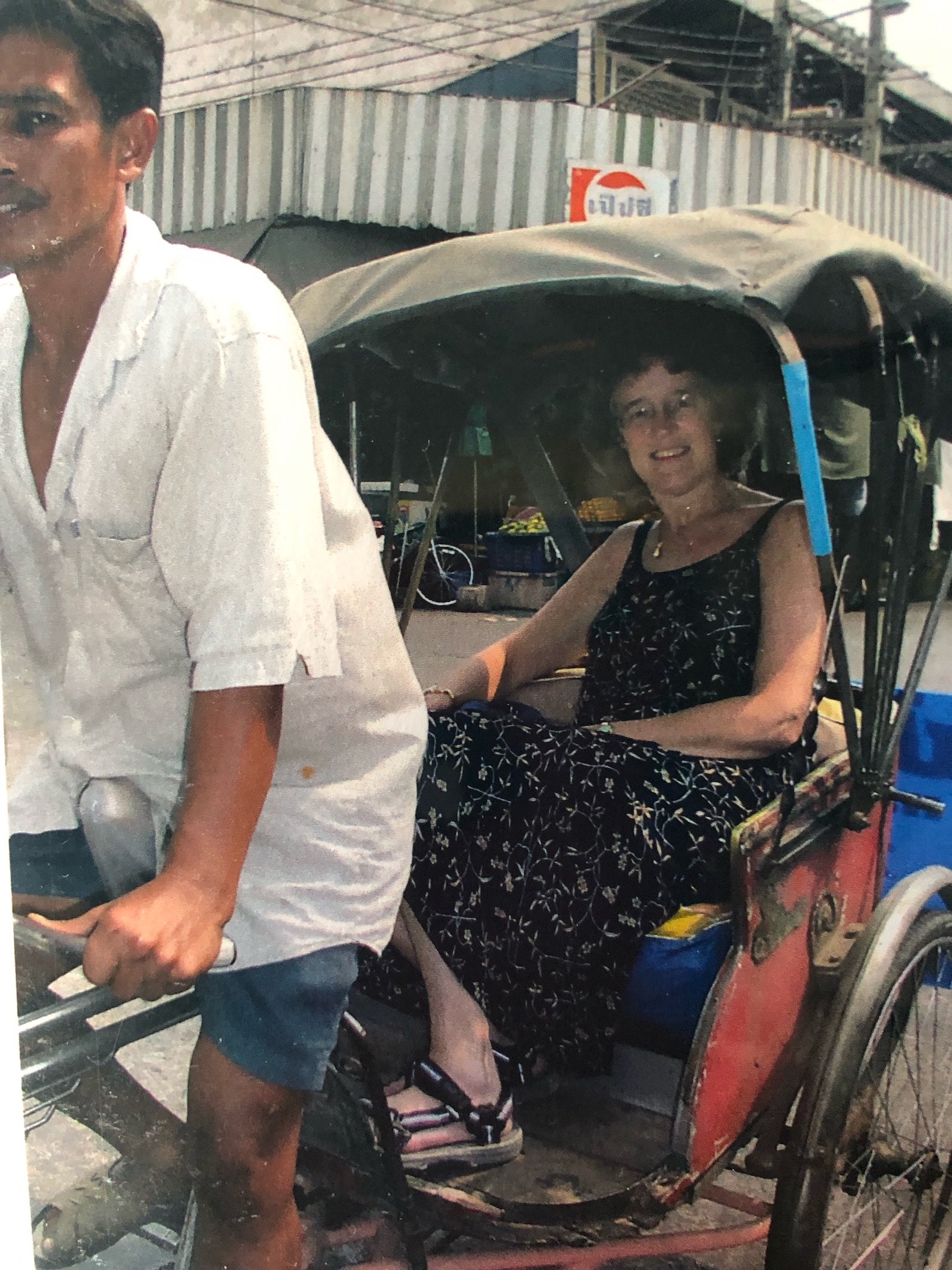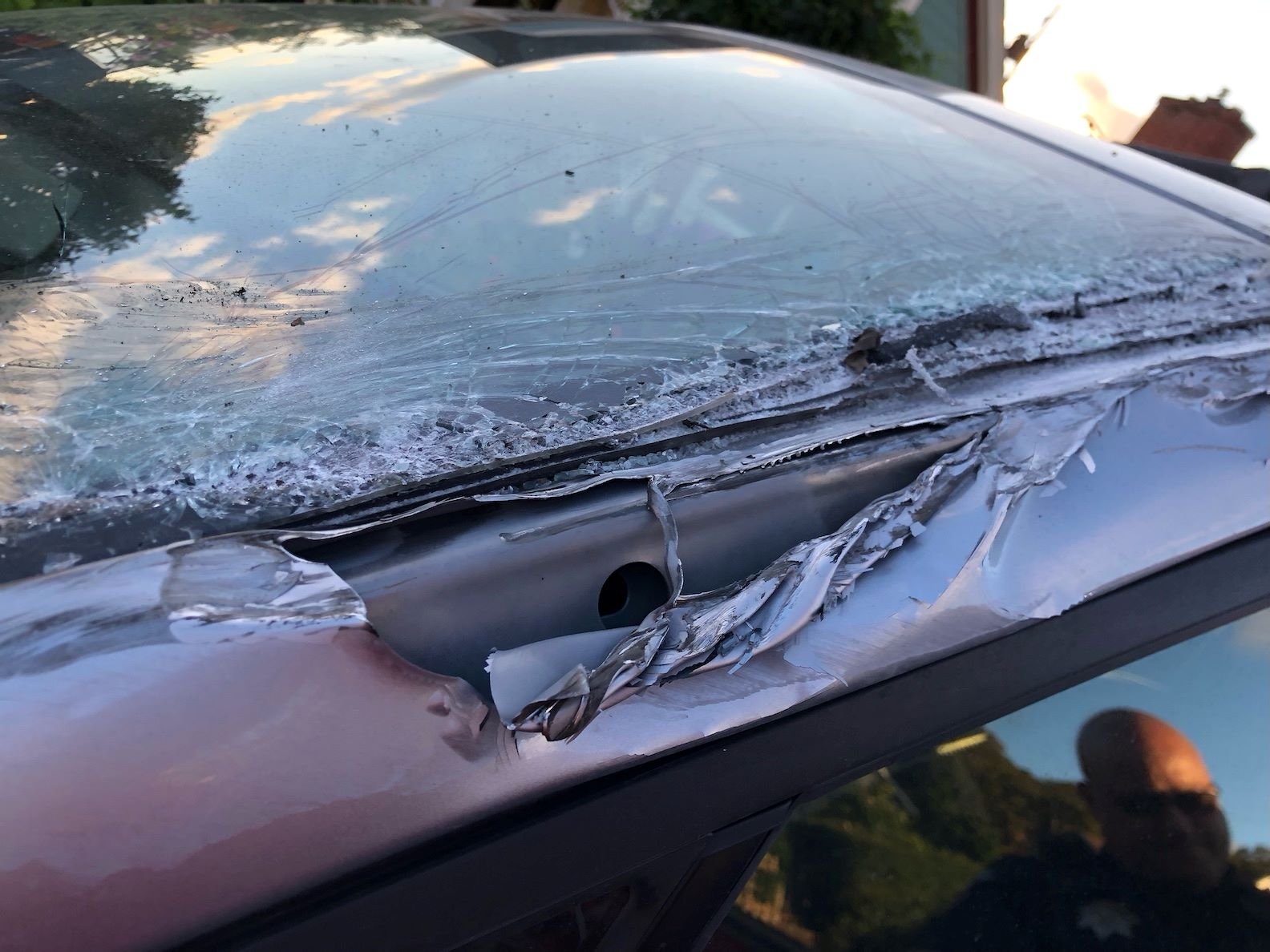Column: Is There an Insurance Before an Accident?
By Nancy Turner
You may remember seeing the photo and story in the CCCNews right after Father’s Day. On June 18th, at 5:30 a.m., a red car crashed into the front of my neighbor’s Prius, then hit the front of my car, and continued to scrape up over the top of my Subaru before flipping over into the middle of 14th Street.
The reckless driver climbed out a window, apparently unhurt. Ever since then, I’ve been haggling with Allstate Insurance Company. They want to pay $2,000 less than the estimated cost of repairs.
Jack’s Body Shop has patiently waited over a month to settle this claim. I have been calling Allstate every few days and it’s like talking to a wall. I might as well be walking through a cemetery. Nobody’s listening. The fellow at Jack’s Body Shop said this happens a lot. My neighbor is having the same problem with a dishwasher’s extended warranty with Allstate. They actually had the gall to tell her to do the repairs herself. She argued that she’d paid for a warranty, so she expected it to be honored. It’s distressing when an insurance company refuses to pay what the contract specifies it should.
Years ago one of my teenagers left a candle burning near curtains in her basement bedroom. She had the good sense to run upstairs to the kitchen, grab the fire extinguisher, and put out the fire. Noxious black smoke had already billowed through all the heat ducts. Firemen arrived, dressed in boots, heavy coats, and face visors. They set up gigantic fans to displace smoke with fresh night air. The entire place reeked of burnt plastic from a burned boom box. Every square inch of the walls, floors, ceilings, and furniture, everything, had to be washed and our clothes sent out to the cleaners. That time Allstate paid for it all, without a hitch. Sometimes insurance companies are a frustrating disappointment and sometimes they come through with flying colors. It seems everyone has an insurance story to tell.
Around the same time as the house fire, I traveled to Thailand to lead a pilgrimage of twenty Americans interested in learning about life in a Buddhist country. One day I made a point of exploring the Chiang Mai Night Market, the mother of all markets. Hundreds of stalls stood crammed together, spilling out into the street. Akha hill tribe ladies peddled their wares while tourists shuffled and gazed at the jumble of brightly colored fabrics, a plethora of beautifully Handmade items, and junky counterfeit designer goods.
I couldn’t help but compare my life in America with life in Thailand. Having recently experienced the safety net of insurance after a fire, I was particularly curious about insurance. Like most Americans, I pay for medical coverage, car, house, and even travel insurance.
These policies don’t promise that nothing bad will happen. We know life is risky. It can’t protect me ahead of time or prevent illness or accidents. But it means I’ll get financial help after I get sick or a disaster strikes. I’m comforted knowing I won’t go bankrupt due to a catastrophic illness or accident. I’m fortunate to be able to afford these indemnities. There are too many people who can’t.
In Thailand, I learned that car insurance is recommended, but not required. It’s voluntary. Property insurance is not mandatory either. It’s optional unless you own a huge hotel or public building. Nobody pays for health insurance. In 2002 Thailand began providing health coverage for free, for all citizens. They have one of the best healthcare systems in the world. Can you imagine how different our lives here would be if everyone had good free medical care? The US is one of the few “advanced” countries that does not provide national health care. It’s a shame.
When a Thai person cannot afford car or home insurance, how did they cope? For one thing, extended family members assume more responsibility than we Westerners are used to. When catastrophe strikes, relatives will often pitch in and provide assistance. They have a tradition of believing we’re all interconnected, and that it’s good karma to care about each other. Another way is by having faith in spiritual protection. If you can’t afford insurance, you might as well do something to prevent harm from happening in the first place.
I’d read that Buddhist amulets are supposed to help you before something bad happens. They are carefully crafted to protect a person from such things as a snakebite, a plane crash, a car wreck, an unfaithful lover, or even jackfruit crop failure. Unlike American insurance, which lends a hand after an event, amulets are meant to be preventative.
As a Westerner, my mind has been trained to test the truth of a concept by looking for practical results. I’m suspicious of speculation and anything unscientific. The idea that an amulet can influence daily events appears irrational and unsubstantiated by known laws of science. Even so, I wanted to know about them. Almost every Thai I saw wore one on a chain around his or her neck.
Market in Thailand
Next to a display of silver jewelry and opium pipes, I found what I was looking for. As I inhaled a whiff of sweet incense, I studied amulets made from bronze, silver, clay, plaster, or gold; some had been mass-produced. Others were carefully hand-crafted by monks and given special blessings. The amulets portrayed the image of a Buddha or other deity and ranged in size from that of a pea to as large as a silver dollar. I found the vast array of objects artistically impressive and irresistible.
When I walked up to the table displaying hundreds of amulets, the salesman sitting on a stool next to his wares, was eating lunch. He put down his ceramic bowl of rice and fish and reached for his solar-powered calculator. It looked like he was ready to haggle over his prices.
“What does this Buddha protect me from?” I inquired. His eyes squinted like short dashes across his smiling leathery face. “For good luck”.
I pointed my finger at a clunky clay figure and asked again, “What does that one protect from?” “For good luck,” he said, nodding his head up and down.
I wondered if he told all farongs (westerners) the same thing. Maybe he assumed I thought using amulets was superstitious and not something to be taken seriously. I wished I spoke Thai.
“Isn’t this one for something else?” I asked, pointing to a bronze figure with a message in Thai inscribed around the edges.
“All same, all same.” He nodded again. It seemed his English wasn’t good enough to explain the differences.
Without bothering to bargain, I bought a delicate chain necklace and a half-inch “gold” Buddha encased in glass, about the size of a nickel. I paid four hundred baht, roughly nine dollars.
I could only imagine what he must have been thinking. Every day he sees tourists who are attached to the material world, not the mystical, and possibly a few who scoffed when he tried to explain his beliefs. In spite of our miscommunications, I persisted.
I placed the chain and amulet around my neck. “If I wear this Buddha amulet, no more problems for me from now on? Right? How can you be sure?”
With his palm open to the sky, he waved his arm in a sweeping gesture across his display of amulets. “Yes, yes, that's right. No problem.” He grinned, then looked down, returning to his bowl of rice and fish, muttering, “You safe now, you safe now.” He probably had decided it was not worth the trouble to explain how amulets provide protection. Maybe there was no explanation. Maybe believing in them made it so.
I have observed events and synchronicities in my life that I could not explain. Like the time I was traveling in Mexico when I became acutely aware that my cat, Charley, whom I’d left with a friend in Portland, was in danger of getting run over. I called from Mexico City to ask my friend to take Charley to my mother’s suburban home, where she’d be safe. He told me my cat had just been hit and killed. How did I know?
There are many mysteries like this. I have been amazed at what emanates from an intangible reality. For instance, where does our soul or individual self come from? Where does it go when we die? Rather than makeup explanations for why this or that happened, I’ve tried to maintain a “don’t know” mind. Humans are generally uncomfortable with the unknown. Sometimes we make up stories or myths to explain things that are beyond our understanding. We all live with many, many unknowns. Who am I to say my scientific, concrete view of the world is more right than the amulet seller’s mystical one? Maybe both are true.
I like to avoid worrying about what awful things might happen. I prefer to maintain an optimistic attitude, but my sense of safety is an illusion. Much of what happens, both good and bad, is beyond my control. Accidents happen. Illnesses occur. Mistakes are made. That’s the way life is. None of us get through life unscathed in one way or another.
The fire from an untended candle was not life-threatening, but it was expensive. Without the financial coverage from Allstate, the cost of the cleanup would have been way beyond my financial resources.
In Thailand, maybe the amulet I wore protected me while I rode through the chaotic streets of Bangkok in a tuk-tuk. Those three-wheeled mechanical rickshaws had no seatbelts or even side doors. They zipped through traffic so fast I could barely breathe. At dusk on a poorly lit side street, the driver almost ran into the back end of an elephant.
Good thing the grey pachyderm had a little blinking light tied to its tail. I can imagine the guffawing if I called my health insurance in Oregon asking them to cover my injuries because I ran into the ass of an elephant.
While my traveling companions and I traversed the country for a month, visiting monasteries from one corner of the country to the other, none of us got sick or were injured. Maybe it was mere good luck. Or maybe my amulet did the trick. Who am I to say?
I like to think my tiny Buddha figure will somehow contribute to my safety. This tangible object is my talisman, reminding me not to worry about all the bad things that could happen. If all it does is calm my nerves, it was worth the 400 bahts I paid for it. And I continue to send a check to my insurance company. I like keeping a foot in both the mundane and the mystical. You just never know.






